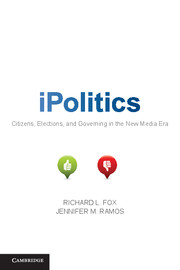Book contents
- Frontmatter
- Contents
- List of Tables and Figures
- Contributors
- Preface and Acknowledgments
- Introduction
- Section I The Shifting Media Universe and News Consumers
- Section II Campaigns and Elections in the New Media Environment
- Section III Civic Mobilization and Governance in the New Information Age
- Index
- References
Introduction
Politics in the New Media Era
Published online by Cambridge University Press: 05 June 2012
- Frontmatter
- Contents
- List of Tables and Figures
- Contributors
- Preface and Acknowledgments
- Introduction
- Section I The Shifting Media Universe and News Consumers
- Section II Campaigns and Elections in the New Media Environment
- Section III Civic Mobilization and Governance in the New Information Age
- Index
- References
Summary
In the ever-changing news and information environment of the early 21st century, citizens and politicians are eagerly adapting new technologies to exercise political power. In the United States, some analysts attribute Barack Obama's success in the 2008 presidential election to the rise of social networking media. Politicians abroad such as Israeli prime minister Benjamin Netanyahu adopted Obama's social networking media strategies to promote his own accomplishments and garner citizen support after seeing its success in the United States. In 2010, Gavin Newsom, the mayor of San Francisco, became the first politician to announce his candidacy (for governor) on Twitter. Netroots activists and bloggers, such as those affiliated with Daily Kos, promote progressive candidates across the United States, solicit and coordinate financial contributions, and provide opportunities for volunteers. On the other side of the political spectrum, conservative “Tea Party” activists capitalize on these strategies as well. In addition, most members of the U.S. Congress, as well as almost all U.S. candidates for any major political office, promote themselves and their accomplishments on Facebook or Twitter.
Political change around the world has also been propelled by new media tools. YouTube, Facebook, and Twitter have been critical organizing tools in the recent citizen protests in Northern Africa and the Middle East. These protests compelled the long-time leader of Tunisia, Zine al-Abidine Ben Ali, to resign and flee the country and forced Egyptian president Hosni Mubarak to step down. These protests are reminiscent of the situation in Iran in 2009, in which citizen-generated videos and commentary played a crucial role in promoting and exposing the presidential election protests. In fact, in the summer of 2009, the U.S. State Department asked Twitter to postpone a network upgrade so as not to disrupt citizen activism in Iran. Yet the use of social media as a tool of citizen rebellion started before Iran. In 2007, the Burmese government tried to block Internet sites, blogs, and cell phone videos from exposing antigovernment protests to the outside world and publicizing the plight of dissidents who suffered under the harsh crackdown by the military government. Clearly, the digital age has drastically transformed the method and style of political communication and mobilization.
- Type
- Chapter
- Information
- iPoliticsCitizens, Elections, and Governing in the New Media Era, pp. 1 - 22Publisher: Cambridge University PressPrint publication year: 2011



